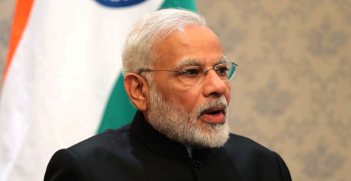India's Amazon Apprehension

While Jeff Bezos received a frosty reception on his India visit, this was not entirely due to his company’s practices.
In mid-January 2020, Amazon CEO Jeff Bezos, made a visit to India. Despite his pledge to invest an additional $1 billion in the country to help digitise small and medium-sized businesses and create one million new jobs, his appearance was greeted by protests on the streets in many cities and hostile remarks by the country’s commerce and industry minister, Piyush Goyal. While disgruntlement at his visit was partly due to a wariness towards many of the anti-competitive practices that Amazon has been accused of, it also spoke to a deeper, ingrained, suspicion towards foreign companies, and international trade itself, that remains a considerable part of the Indian worldview.
Bezos’s vision for Amazon’s operations in India is to be able to expand the reach of many of the country’s small and medium-sized businesses through online sales, and in doing so he projects that these businesses could be selling around US $10 billion of Indian goods through Amazon by 2025. This approach, however, is mostly shaped by India’s laws around how companies like his can operate in the country. In early-2019 New Delhi introduced new laws that barred foreign-owned ecommerce companies from selling their own inventory in India. This forces Amazon to operate in the country more like eBay, as a platform for other businesses, rather than a retailer itself. This was an update of laws introduced in the early-1990s – when India initially opened its economy to foreign direct investment – that sought to protect small-scale shopkeepers from large multinationals supermarket chains and other retail outlets.
This fear of Indian businesses being overrun by large, well-resourced, multinational companies like Amazon has some credence. Amazon has consistently been seen to use unfair and anticompetitive practices to smother its competition. While Bezos was in India, the Competition Commission of India (CCI) initiated an inquiry into Amazon, alleging that the company has been providing preferential treatment to a number of merchants on its platform, merchants which Amazon has an ownership stake in.
Yet India’s suspicion towards foreign companies like Amazon goes deeper than just the poor practices of large multinationals. There is a perspective towards foreign trade and investment that was forged from India’s independence struggle, and this perspective continues to permeate India’s approach today. The Swadeshi (self-reliance) movement initially had laudable goals; the aim was to try and limit British revenues derived from its colonial occupation of India by boycotting British goods, and in doing so also attempt to regenerate local industries. This was seen as not only a way to make British rule in India less attractive to London, but also lay the necessary groundwork for achieving Swaraj, or self-rule, where India’s own capabilities would need to be enhanced.
Upon independence, the tactic of Swadeshi merged with Prime Minister Jawaharlal Nehru’s centrally planned vision for India’s industrialisation, cementing the idea that India could fully achieve Swaraj by creating an economic structure based solely on Indian land, materials, labour, and technology. This perspective ignored basic economic principles like comparative advantage, and placed the country at odds with the increasingly integrated global economy. Instead of gaining control over its own destiny, this approach limited India’s growth and its capabilities, and hindered the country’s progress towards great power status, and the greater freedom of action that would accompany this.
Despite the liberalising reforms of the early-1990s, this suspicion towards foreign investment and trade remains the dominant lens of the bureaucracy, the trade unions, and the country’s political parties. This includes the governing Bharatiya Janata Party (BJP) of Prime Minister Narendra Modi. The narrative that the BJP would be the party to disentangle India from its habitual protectionist tendencies has proved a false one. Indeed, this perspective has failed to truly understand the party, bestowing upon them a conventional Western conception of “right-wing” as being an economically liberal force. Yet the party’s ideological fountainhead, the Rashtriya Swayamsevak Sangh (RSS) – National Volunteers Organsiation – is deeply wedded to the idea of Swadeshi as part of its holistic and insular Hindu nationalism.
The Indian government’s decision to withdraw from negotiations for the Regional Comprehensive Economic Partnership (RCEP) can be seen as being partly driven by the influence of the RSS on the BJP government’s decision making. Yet there is also a more direct influence on the BJP and its perspectives and decisions towards any further liberalising reforms or international free trade agreements. The country’s largest corporations donate heavily to the BJP in order to buy protection for their current market share from the competition foreign companies may create.
These factors have led, and continue to lead, India to not follow the usual Asian development strategy of exporting labour-intensive and low-priced manufactured goods to the West. Instead, the growth that the country has experienced has been driven by domestic consumption rather than foreign investment, services more than manufacturing, and niche high-tech industries rather than mass consumer products.
These are all positive in their own way, but of themselves they do not solve one of India’s fundamental problems: creating enough employment for its vast and youthful population. India sits on the edge of either a serious demographic advantage, where if enough opportunity can be created for its young population, then the country’s growth, its prosperity, and its capabilities could develop rapidly. Or, if this opportunity cannot be created, the country could be saddled with a large mass of underemployed and disgruntled youth, whose frustrations could seriously impact the country’s stability.
Most notably, India is struggling to shift its population away from inefficient agricultural practices, with 43 percent of the country’s total workforce continuing to be employed in the sector (by contrast developed economies like Australia the figure is just 3 percent and the United States is 1 percent). However, the economic shock required to shift large percentages of the population off the land and into more productive urban economic activity would be democratic suicide in India, where the rural poor vote in greater numbers than the urban middle classes, and who may not immediately see their opportunities being enhanced by major changes to the way they organise their lives. This creates another layer of resistance to further liberalisation (and a major thorn in the side of Australia’s attempt to secure a free-trade agreement with India).
Jeff Bezos’ visit to India provided a high-profile example of the complexity of India’s relationship to foreign investment, and the hurdles that remain in place for foreign companies who see great potential in the Indian market. While there are serious concerns about the way Amazon does business, this is best left to bodies like the Competition Commission of India, who have the capabilities to assess the way companies operate and sanction them accordingly. For the Indian government, however, it can’t afford to alienate companies that wish to invest in, and trade with the country. It’s economic growth rate has now fallen to 5 percent per annum, a figure most countries would be ecstatic with, but not a rate that can provide the quantity of opportunities the country’s population requires.
Grant Wyeth is a columnist for The Diplomat. His specialises in issues concerning Australia and the Pacific, India and Canada
This article is published under a Creative Commons Licence and may be republished with attribution.





